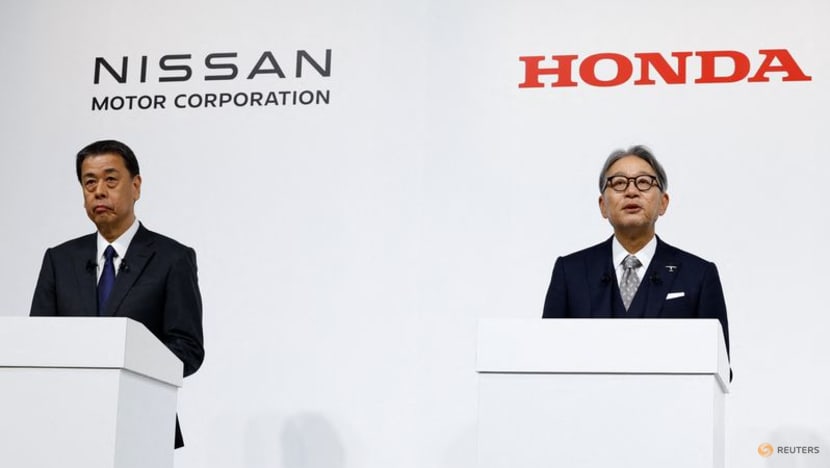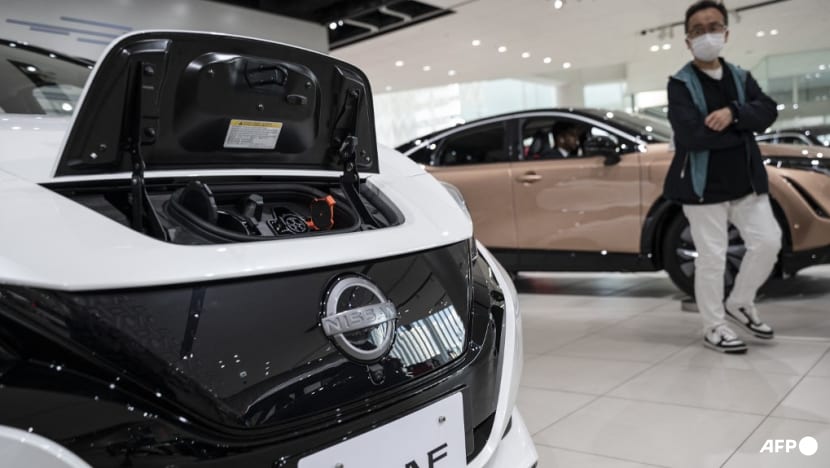Nissan and Honda end merger talks, scuttling US$60 billion deal

Makoto Uchida, Director, Representative Executive Officer, President and CEO of Nissan Motor Corporation and Toshihiro Mibe, Director, President and Representative Executive Officer of Honda, hold a joint press conference on their merger talks, in Tokyo, Japan, Dec 23, 2024. (Photo: REUTERS/Kim Kyung-Hoon)
YOKOHAMA: Japan's Nissan and Honda ended talks to create an auto group worth US$60 billion on Thursday (Feb 13), pitching Nissan into greater uncertainty although the automakers promised to continue to collaborate on electric vehicles.
Announced in late December, the discussions between Honda, Japan's second-largest automaker, and Nissan, its third-largest, were soon complicated by growing differences, including over the balance of power in the tie-up.
It was Honda's proposal that Nissan become a subsidiary that ultimately sank the deal, sources have said.
The two had sought to join forces to better combat the challenges unleashed by fast-rising Chinese electric vehicle makers. They plan to continue to cooperate on technology and other areas.
Honda and Nissan said in a joint statement that the companies will collaborate to thrive in "the era of intelligence and electrified vehicles, striving to create new value and maximise the corporate value of both companies".
The cancellation of the merger talks would have no impact on the earnings of both automakers, it said.
Nissan, Japan's third-largest automaker is in many ways the most troubled of legacy carmakers, having never fully recovered from the years of crisis and management turmoil sparked by the 2018 arrest and ouster of former chairman Carlos Ghosn.
"Honda is pretty confident and has a lot in their favour, whereas Nissan is in a bad place. They don't have a dance partner right now," said Christopher Richter, Japan autos analyst at brokerage CLSA.
"They probably need to think about doing something different."
The merger would have created the world's fourth-biggest by vehicle sales after Toyota, Volkswagen and Hyundai.
Honda CEO Toshihiro Mibe told a press conference that while merging the two companies would have meant "quick pain", he ultimately became more worried about the fallout if the talks dragged on without progress.
He called the failure of the discussions "disappointing" but also said Honda wanted to think about the possibility of tying up with companies other than Nissan and Mitsubishi Motors.
Mitsubishi, a junior partner in the alliance Nissan has with Renault, had been part of the merger discussions although sources had said it was unlikely to participate. It also bowed out of the talks on Thursday.

RESTRUCTURING
In addition to the rapid rise of Chinese electric vehicle makers such as BYD, Japanese automakers are also facing the prospect of tariffs in the United States, another major market.
Nissan is pushing ahead with a restructuring plan announced in November that includes cutting 9,000 jobs and reducing global capacity by 20 per cent. It has yet to disclose details such as which locations will be affected.
Sources said in December that Nissan will need to further reduce its capacity in China, where it operates eight factories through its joint venture with Dongfeng Motor. It has already suspended production at its Changzhou plant as part of efforts to optimise operations.
Before announcing the merger discussions in December, Nissan and Honda had been holding separate talks on a technology collaboration, which they could outline the scope of on Thursday.
Nissan is now open to working with new partners, with Taiwan's Foxconn seen as one candidate, sources told Reuters last week.
Foxconn Chairman Young Liu said on Wednesday that it would consider taking a stake in Nissan but that its main aim was cooperation.
Nissan shares soared more than 60 per cent and Honda's jumped around 26 per cent in late December after the merger talks were first reported on Dec 17. Those gains have since been pared to 21 per cent for Nissan and 11 per cent for Honda.
Nissan's market capitalisation is now nearly five times smaller than that of Honda, which is about 7.5 trillion yen (US$48.6 billion). A decade ago, the pair were both worth around 4.6 trillion yen.
















